甘地英文介绍
- 格式:ppt
- 大小:1.48 MB
- 文档页数:22
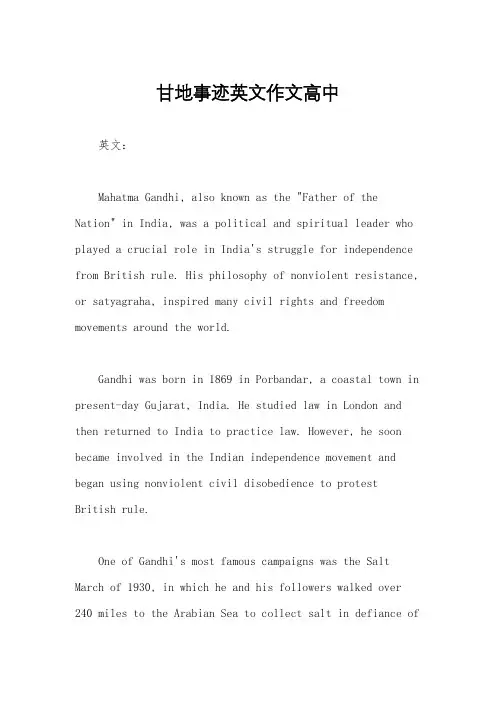
甘地事迹英文作文高中英文:Mahatma Gandhi, also known as the "Father of the Nation" in India, was a political and spiritual leader who played a crucial role in India's struggle for independence from British rule. His philosophy of nonviolent resistance, or satyagraha, inspired many civil rights and freedom movements around the world.Gandhi was born in 1869 in Porbandar, a coastal town in present-day Gujarat, India. He studied law in London and then returned to India to practice law. However, he soon became involved in the Indian independence movement and began using nonviolent civil disobedience to protestBritish rule.One of Gandhi's most famous campaigns was the Salt March of 1930, in which he and his followers walked over 240 miles to the Arabian Sea to collect salt in defiance ofBritish salt taxes. This act of civil disobedience sparked international attention and helped to galvanize the Indian independence movement.Gandhi's commitment to nonviolence and his belief inthe power of love and compassion inspired many peoplearound the world. He once said, "An eye for an eye willonly make the whole world blind." This message resonateswith people today, as we continue to struggle with violence and conflict in many parts of the world.中文:甘地,也被称为印度的“国父”,是一位政治和精神领袖,对印度从英国统治下独立的斗争起了至关重要的作用。
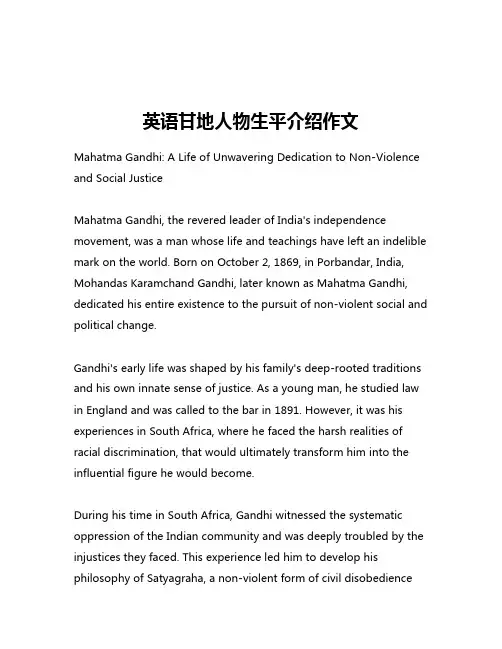
英语甘地人物生平介绍作文Mahatma Gandhi: A Life of Unwavering Dedication to Non-Violence and Social JusticeMahatma Gandhi, the revered leader of India's independence movement, was a man whose life and teachings have left an indelible mark on the world. Born on October 2, 1869, in Porbandar, India, Mohandas Karamchand Gandhi, later known as Mahatma Gandhi, dedicated his entire existence to the pursuit of non-violent social and political change.Gandhi's early life was shaped by his family's deep-rooted traditions and his own innate sense of justice. As a young man, he studied law in England and was called to the bar in 1891. However, it was his experiences in South Africa, where he faced the harsh realities of racial discrimination, that would ultimately transform him into the influential figure he would become.During his time in South Africa, Gandhi witnessed the systematic oppression of the Indian community and was deeply troubled by the injustices they faced. This experience led him to develop his philosophy of Satyagraha, a non-violent form of civil disobediencethat would become the cornerstone of his approach to social and political change.Upon his return to India in 1915, Gandhi quickly became a prominent figure in the Indian independence movement. He recognized the power of non-violent resistance and used it to rally the masses against the British colonial rule. His famous Salt March, a peaceful protest against the British monopoly on salt production, became a symbol of the Indian people's determination to achieve self-rule.Throughout his life, Gandhi remained steadfast in his commitment to non-violence. He believed that true change could only be achieved through peaceful means and that the use of force or violence would only perpetuate the cycle of oppression and conflict. This unwavering belief in non-violence earned him the title of "Mahatma," or "Great Soul," from his admirers.Gandhi's influence extended far beyond the borders of India. His teachings and philosophy inspired civil rights movements around the world, including the work of Martin Luther King Jr. in the United States. His message of peace, tolerance, and social justice resonated with people of all backgrounds, and his legacy continues to inspire generations of activists and leaders.One of the most remarkable aspects of Gandhi's life was his ability tolead by example. He lived a simple, austere life, eschewing material possessions and dedicating himself to the betterment of his people. He famously spun his own clothes, wore a simple loincloth, and lived on a diet of fruits and vegetables. This lifestyle not only demonstrated his commitment to his principles but also served as a powerful symbol of the self-reliance and independence he sought for India.Gandhi's influence was not limited to the political realm; he also made significant contributions to the fields of education, social reform, and religious harmony. He believed that true progress could only be achieved through the upliftment of the masses, and he worked tirelessly to improve the lives of the poor and marginalized.One of Gandhi's most enduring legacies is his role in the Indian independence movement. Through his leadership and unwavering commitment to non-violence, he inspired millions of Indians to join the struggle for freedom. His famous words, "Be the change you wish to see in the world," became a rallying cry for the Indian people and a testament to the power of individual action.Gandhi's life was not without its challenges and setbacks. He faced imprisonment on numerous occasions for his acts of civil disobedience and was even the target of an assassination attempt. However, he remained steadfast in his beliefs, always advocating forpeace and reconciliation even in the face of adversity.Tragically, Gandhi's life was cut short on January 30, 1948, when he was assassinated by a Hindu nationalist who disagreed with his inclusive vision for India. Despite his untimely death, Mahatma Gandhi's legacy continues to inspire people around the world to this day. His teachings on non-violence, social justice, and the power of the individual to create change have become universal principles that transcend time and place.In conclusion, Mahatma Gandhi's life was a testament to the transformative power of non-violence and the unwavering pursuit of social justice. Through his actions and teachings, he left an indelible mark on the world, inspiring generations of activists and leaders to follow in his footsteps. His legacy continues to guide us in our own struggles for a more just and equitable society, reminding us that true change can only be achieved through the strength of our convictions and the power of our collective will.。
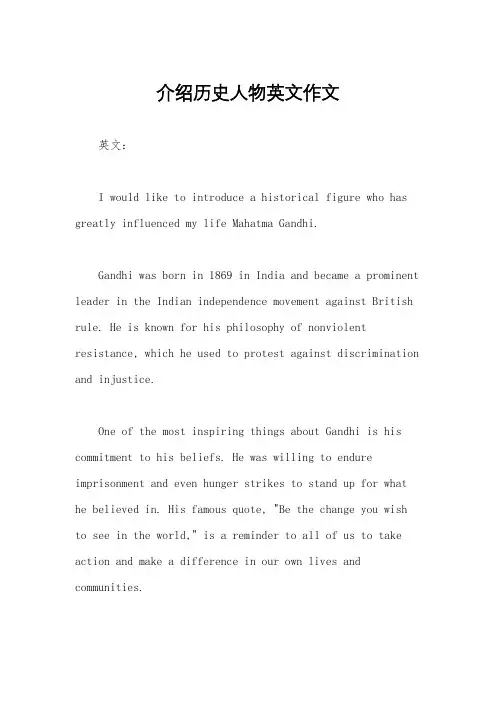
介绍历史人物英文作文英文:I would like to introduce a historical figure who has greatly influenced my life Mahatma Gandhi.Gandhi was born in 1869 in India and became a prominent leader in the Indian independence movement against British rule. He is known for his philosophy of nonviolent resistance, which he used to protest against discrimination and injustice.One of the most inspiring things about Gandhi is his commitment to his beliefs. He was willing to endure imprisonment and even hunger strikes to stand up for what he believed in. His famous quote, "Be the change you wish to see in the world," is a reminder to all of us to take action and make a difference in our own lives and communities.Gandhi's influence extends far beyond India. His ideas of nonviolence and civil disobedience have inspired countless social and political movements around the world, including the American civil rights movement led by Martin Luther King Jr.In my own life, Gandhi's teachings have been a guiding force. Whenever I face a difficult situation, I try to remember his words and approach the problem with a peaceful and compassionate mindset. I also strive to be a positive influence in my own community, just as Gandhi was in his.中文:我想介绍一个对我的人生产生了巨大影响的历史人物——圣雄甘地。

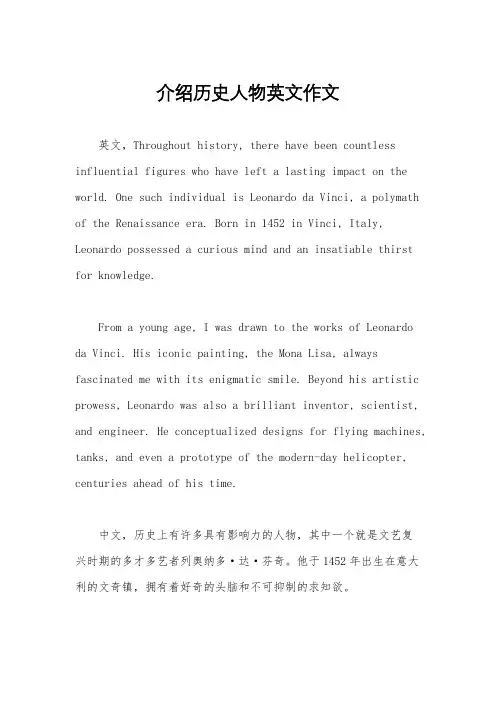
介绍历史人物英文作文英文,Throughout history, there have been countless influential figures who have left a lasting impact on the world. One such individual is Leonardo da Vinci, a polymath of the Renaissance era. Born in 1452 in Vinci, Italy, Leonardo possessed a curious mind and an insatiable thirst for knowledge.From a young age, I was drawn to the works of Leonardo da Vinci. His iconic painting, the Mona Lisa, always fascinated me with its enigmatic smile. Beyond his artistic prowess, Leonardo was also a brilliant inventor, scientist, and engineer. He conceptualized designs for flying machines, tanks, and even a prototype of the modern-day helicopter, centuries ahead of his time.中文,历史上有许多具有影响力的人物,其中一个就是文艺复兴时期的多才多艺者列奥纳多·达·芬奇。
他于1452年出生在意大利的文奇镇,拥有着好奇的头脑和不可抑制的求知欲。
从小,我就被列奥纳多·达·芬奇的作品所吸引。
他标志性的作品《蒙娜丽莎》以其神秘的微笑一直让我着迷。

英语作文介绍人物英雄模板英文回答:Title: The Epitome of Heroism: A Comprehensive Exemplar for Composing a Character Sketch。
Introduction:In the realm of literature, the portrayal of heroic characters serves as a beacon of inspiration, illuminating the path of virtue and resilience. Heroes embody the pinnacle of human potential, embodying qualities that transcend the ordinary and inspire awe and admiration. This comprehensive exemplar aims to provide a detailed template for crafting a character sketch that captures the essenceof heroism.Body Paragraph 1: Unwavering Courage and Determination。
At the core of heroism lies unwavering courage andunwavering determination. Heroes possess an indomitable spirit that enables them to face adversity head-on, undeterred by fear or setbacks. They are driven by a resolute commitment to their cause, regardless of the obstacles they may encounter. They are exemplified by characters such as Odysseus in Homer's Odyssey, who persevered through countless trials and tribulations with unwavering resolve.Body Paragraph 2: Unselfish Sacrifice and Compassion。
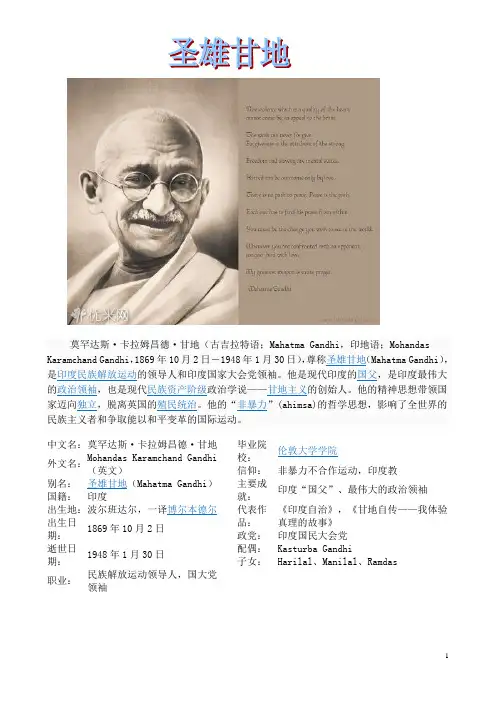
中文名:莫罕达斯·卡拉姆昌德·甘地外文名:Mohandas Karamchand Gandhi (英文)别名:圣雄甘地(Mahatma Gandhi)国籍:印度出生地:波尔班达尔,一译博尔本德尔出生日期:1869年10月2日逝世日期:1948年1月30日职业:民族解放运动领导人,国大党领袖毕业院校:伦敦大学学院信仰:非暴力不合作运动,印度教主要成就:印度“国父”、最伟大的政治领袖代表作品:《印度自治》,《甘地自传——我体验真理的故事》政党:印度国民大会党配偶:Kasturba Gandhi子女:Harilal、Manilal、Ramdas甘地赢得了许许多多男女老少对他的爱戴和忠诚,包括各种宗教信仰的欧洲人以及几乎不同政治倾向的所有印度人。
汉译英:Mohandas Karam, Chang De Gandhi ( Gujarati; Mahatma Gandhi, Mohandas Karamchand Gandhi Hindi; October 2, 1869year January 30th,1948), called Mahatma Gandhi( Mahatma Gandhi ), is the national liberation movement of India 's leaders and India National Congress Party leader. He is the father of modern India, India is the most great political leader, is also the modern national bourgeois political theory -- the founder of the Gandhi doctrine. His spirit to lead the country to independence, from the British colonial rule. His" non-violent" ( ahimsa ) philosophy, influenced the whole world nationalist and strive to peaceful change of international sports.。
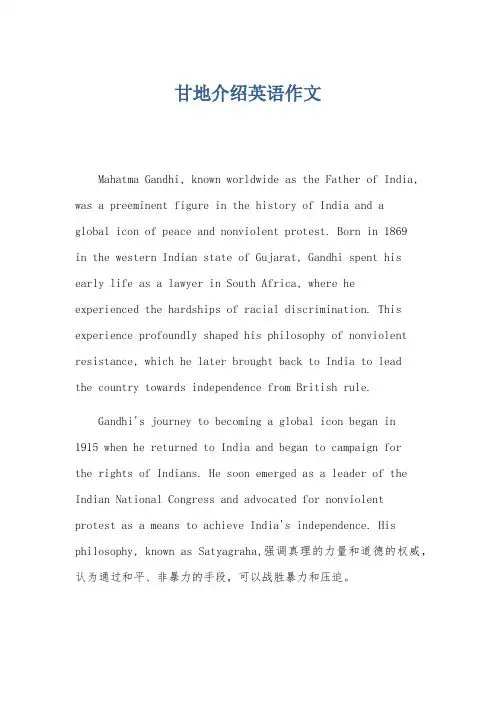
甘地介绍英语作文Mahatma Gandhi, known worldwide as the Father of India, was a preeminent figure in the history of India and aglobal icon of peace and nonviolent protest. Born in 1869in the western Indian state of Gujarat, Gandhi spent his early life as a lawyer in South Africa, where heexperienced the hardships of racial discrimination. This experience profoundly shaped his philosophy of nonviolent resistance, which he later brought back to India to leadthe country towards independence from British rule.Gandhi's journey to becoming a global icon began in1915 when he returned to India and began to campaign forthe rights of Indians. He soon emerged as a leader of the Indian National Congress and advocated for nonviolentprotest as a means to achieve India's independence. His philosophy, known as Satyagraha,强调真理的力量和道德的权威,认为通过和平、非暴力的手段,可以战胜暴力和压迫。
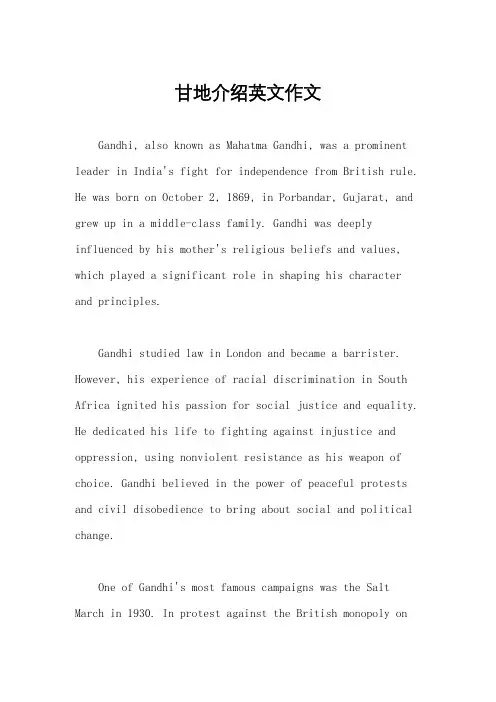
甘地介绍英文作文Gandhi, also known as Mahatma Gandhi, was a prominent leader in India's fight for independence from British rule. He was born on October 2, 1869, in Porbandar, Gujarat, and grew up in a middle-class family. Gandhi was deeply influenced by his mother's religious beliefs and values, which played a significant role in shaping his character and principles.Gandhi studied law in London and became a barrister. However, his experience of racial discrimination in South Africa ignited his passion for social justice and equality. He dedicated his life to fighting against injustice and oppression, using nonviolent resistance as his weapon of choice. Gandhi believed in the power of peaceful protests and civil disobedience to bring about social and political change.One of Gandhi's most famous campaigns was the Salt March in 1930. In protest against the British monopoly onsalt production, Gandhi led a march of thousands of people to the Arabian Sea, where they made their own salt by evaporating seawater. This act of civil disobedience was a powerful symbol of defiance against British rule and inspired many Indians to join the independence movement.Gandhi's philosophy of nonviolence, or ahimsa, was not only a political strategy but also a way of life. He believed in treating all living beings with respect and compassion, advocating for the rights of the oppressed and marginalized. Gandhi's teachings on nonviolence and peaceful coexistence continue to inspire movements for social justice around the world.Despite facing numerous challenges and setbacks, Gandhi remained steadfast in his commitment to nonviolence and justice. He was imprisoned several times during his struggle for independence, but never wavered in his principles. Gandhi's unwavering determination and moral courage continue to serve as an inspiration for individuals and movements advocating for change.Gandhi's legacy extends far beyond India's independence. His teachings on nonviolence, self-discipline, and truth have influenced leaders and activists around the world. He believed in the power of individuals to create change and encouraged people to take responsibility for their actions. Gandhi's message of peace and equality remains as relevant today as it was during his lifetime.In conclusion, Mahatma Gandhi was a remarkable leader who dedicated his life to fighting for justice and equality. His philosophy of nonviolence and his unwavering commitment to his principles continue to inspire people around the world. Gandhi's legacy serves as a reminder that change is possible through peaceful means and that individuals have the power to make a difference.。
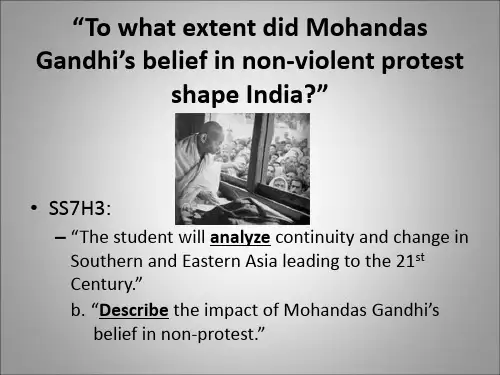
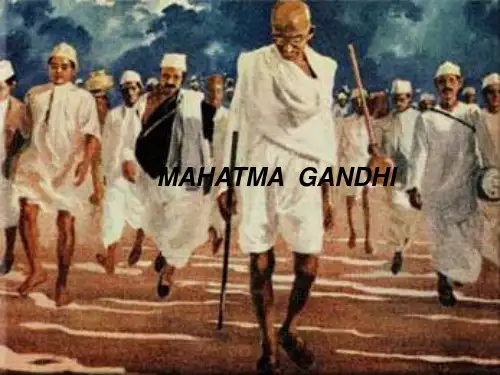
甘地事迹英文作文高中英文:Gandhi, also known as Mahatma Gandhi, was a great leader and activist in India who fought for the country's independence and civil rights. His life and achievements have inspired many people around the world, including myself.One of the most remarkable things about Gandhi was his philosophy of nonviolent resistance. He believed that violence only begets more violence, and that the only way to truly achieve lasting change was through peaceful means. This philosophy was put into practice in many of his campaigns, including the Salt March in 1930, where he and his followers peacefully protested against the British salt tax by making their own salt from seawater.Another aspect of Gandhi's life that I find inspiring is his commitment to living a simple life. He believed inthe importance of self-sufficiency and self-reliance, and often wore simple clothing and lived in modest homes. This lifestyle was in stark contrast to the opulence and excess of the British colonial rulers at the time, and it helped to inspire many Indians to embrace a simpler way of life.Overall, Gandhi's legacy is one of courage, compassion, and dedication to justice. His life and teachings continue to inspire people around the world to fight for what they believe in, and to do so with love and nonviolence.中文:甘地,也被称为圣雄甘地,是印度的一位伟大领袖和活动家,为国家的独立和民权斗争。
介绍甘地的英语作文150词Mahatma Gandhi, a revered figure in the history of India, is remembered for his principles of non-violent protest and social reform. Born into a humble family, Gandhi rose to become the face of India's independence movement, leading millions in peaceful demonstrations against British colonial rule. His belief in the power of ahimsa, or non-violence, shaped not only his political career but also his personal life, where he practiced simplicity and humility. Gandhi's influence extends beyond India's borders, as his teachings on non-violent protest have been adopted by activists around the globe. His legacy remains relevant today, reminding us that peaceful resistance can be a powerful tool for social change.甘地:非暴力革命者的力量甘地,这位在印度历史上备受尊敬的人物,以非暴力抗议和社会改革的原则而闻名。
他出身于一个卑微的家庭,却崛起成为印度独立运动的代表,领导数百万人以和平示威的方式反对英国殖民统治。
以下是印度著名景点中英文介绍:1. 总统府与国会大厦、印度门(Lal Qila)、德里红堡(Qutub Minar):* 英文介绍:These landmarks in Delhi are must-visit attractions, whether you're interested in Indian history, politics, or art. The President's Palace, Parliament House, and the iconic Gateway of India are all located in this vibrant city.* 中文介绍:这些德里景点是必游之地,无论您对印度历史、政治还是艺术感兴趣。
总统府、国会大厦和标志性的印度门都位于这座充满活力的城市中。
2. 世界最大的贾玛(Jama)清真寺:* 英文介绍:The Jama Masjid is the largest mosque in the world and is located in Delhi. It is a magnificent example of Islamic architecture and is a popular tourist destination.* 中文介绍:贾玛清真寺是世界上最大的清真寺,位于德里。
它是伊斯兰建筑的壮丽典范,也是热门的旅游目的地。
3. 甘地墓(Raj Ghat):* 英文介绍:Gandhi Smriti, also known as Raj Ghat, is the final resting place of the "Father of India," Mahatma Gandhi. It is a simple memorial that pays tribute to his life and legacy.* 中文介绍:甘地陵园也被称为拉吉·加特,是“印度之父”圣雄甘地的最后安息之地。
甘地介绍英文作文下载温馨提示:该文档是我店铺精心编制而成,希望大家下载以后,能够帮助大家解决实际的问题。
文档下载后可定制随意修改,请根据实际需要进行相应的调整和使用,谢谢!并且,本店铺为大家提供各种各样类型的实用资料,如教育随笔、日记赏析、句子摘抄、古诗大全、经典美文、话题作文、工作总结、词语解析、文案摘录、其他资料等等,如想了解不同资料格式和写法,敬请关注!Download tips: This document is carefully compiled by theeditor. I hope that after you download them,they can help yousolve practical problems. The document can be customized andmodified after downloading,please adjust and use it according toactual needs, thank you!In addition, our shop provides you with various types ofpractical materials,such as educational essays, diaryappreciation,sentence excerpts,ancient poems,classic articles,topic composition,work summary,word parsing,copyexcerpts,other materials and so on,want to know different data formats andwriting methods,please pay attention!Gandhi was an amazing leader. He dedicated his life to fighting for justice and equality.He used non-violence as a powerful tool. His methods inspired many people around the world.Gandhi had a great impact on India's history. He led many protests and movements.He was really committed to his beliefs. His ideas still resonate today.。